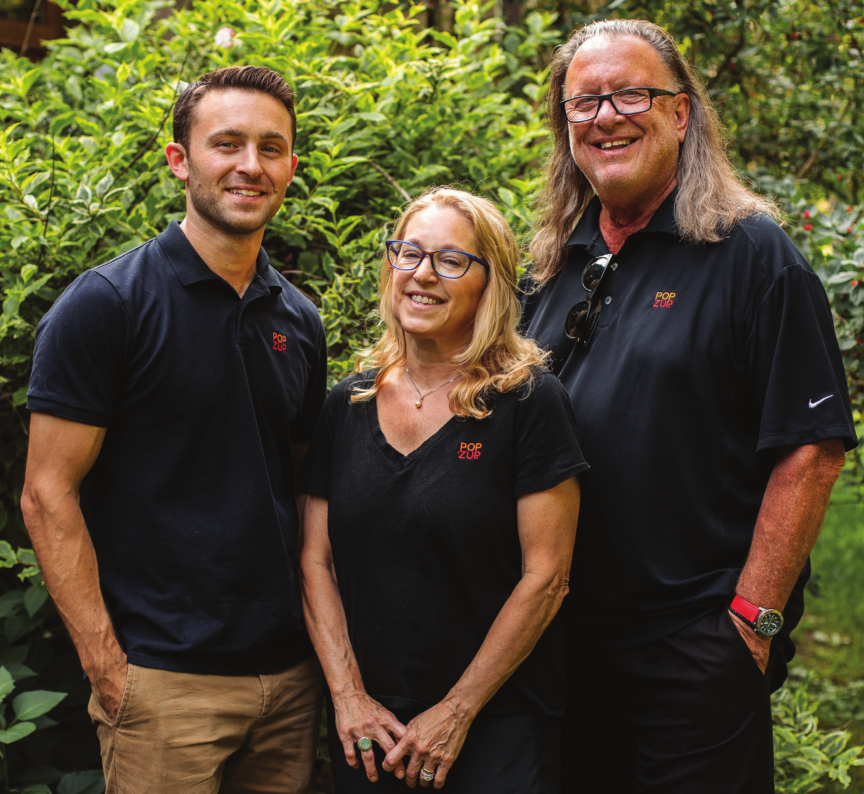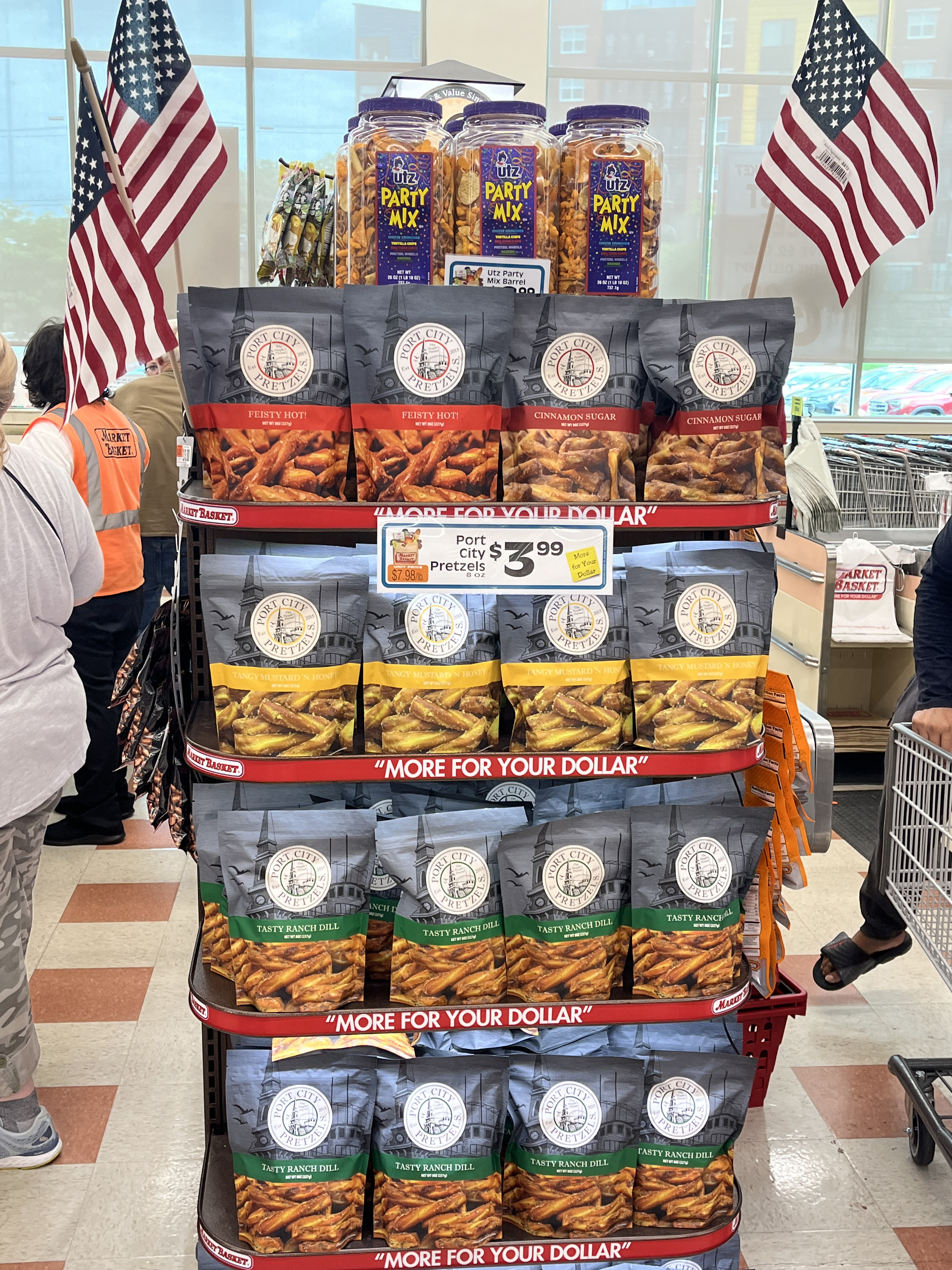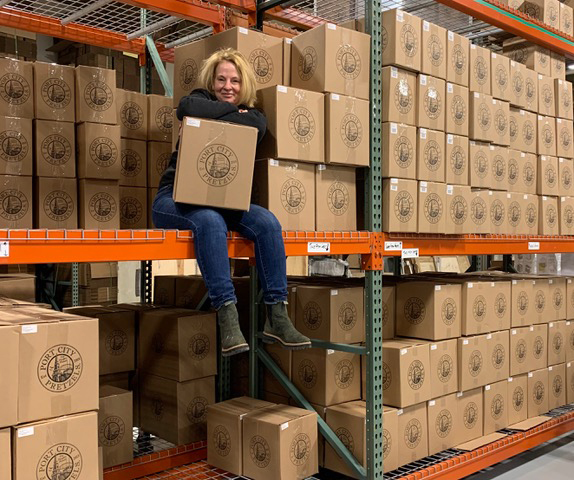Wrap City Chips, Port City Pretzels and Popzup Popcorn are finding fans in the Granite State and beyond

It’s crunch time in the Granite State.
Riding a food-quality trend that invokes natural ingredients and local sourcing, several small New Hampshire businesses have taken their snack foods from specialty stores into regional supermarkets and even across the country.
Potato chip maker Wrap City Chips, which opened an industrial-park chip operation in Derry in 2020, sells its product in Market Basket and small stores throughout the state.
And owners of Somersworth-based popcorn maker Popzup Popcorn and Portsmouth-based pretzel baker Port City Pretzels say they’ve seen sales double for years at a stretch, prompting them to acquire new equipment and move into larger spaces.
All three products are for sale at some supermarkets in the Granite State, and two are found on shelves far from New England.
“I didn’t know I was in South Dakota. I don’t even know what store it is,” said Suzanne Foley, founder and chief executive of Port City Pretzels. But a distributor she works with assured her that the pretzels, packaged in a bag marked by an etching of the Portsmouth North Church and the I-95 bridge, are being sold in a state with more prairieland than waterfront.

Nolan, Julie and Marty Lapham operate Popzup Popcorn in Somersworth. The gourmet popcorn maker, which sells several varieties of popped popcorn, packaged unpopped kernels and popcorn seasonings, was founded in 2015. (Photos courtesy of Popzup Popcorn)
Snack food company owners attribute their success to creation of a highend product, tight quality controls, and focus on details such as packaging and trade shows.
And the smaller the list of ingredients seems to command a higher price.
Popzup Popcorn, for example, uses GMO-free corn kernels and lists five ingredients in its Cheddar Head flavor.
A bag sells for $5.19 at a Manchester Hannaford, and company founder Julie Lapham said a bag can go for up to $11 at posh locations such as the Hamptons on Long Island and Sun Valley, Idaho.
“Sometimes, we feel like we can’t make it fast enough,” Lapham said.
Lapham and her husband, Marty, founded the company in 2015 and moved operations to Somersworth last April. The company employs 15 people. She did not provide sales figures in dollar terms, but said sales have doubled every year since Popzup has been in operation.
Popzup has a map on its website that pinpoints retail locations where it is sold. Lapham said the list is incomplete, but in late July, it showed nearly 1,400 in the Northeast, 48 on the West Coast, 50 in the Southwest and one in Iceland.
She attributes the reach to trade shows, from regional shows in New England to larger shows such as the New York-based Fancy Foods Show and the Philadelphia-based Expo East.
Last year, Popzup exhibited at the Expo West show, which drew 65,000 people and 3,000 brands to Anaheim, Calif. Such shows can link producers with distributors, who will sign on promising producers with reduced entry fees, expecting that demand will grow.
The distributor works to get a product into an anchor store in a region, and then expand to independent stores, Lapham said. That has landed Popzup in Central Market in Austin, Bristol Farms in Los Angeles and Kowalski’s Markets in Minneapolis.
Locally, she lauds Hannaford for its support of local brands. Her popcorn products as well as Port City Pretzels are displayed side-by-side in displays that emphasize locally made products.
Supermarkets are always on the lookout for new brands, and customers are increasingly demanding locally made products, said Chris Maher, owner of SnackAisle, a small distribution facility with a warehouse in Auburn.

Four varieties of Port City Pretzels fill a display between two checkout aisles at a Market Basket in Manchester. (Photo by Mike Cote/NH Business Review)
“Grocery stores are not exactly local, so any hint of being local is a win for them,” he said.
Foley of Port City Pretzel said she initially rebuffed offers by Market Basket, fearing she could not keep up with the demand.
But two years later, a broker arranged a meeting. Now, the Massachusetts-based chain is the company’s largest customer.
“For a small company to go into grocery stores, it’s an enormous leap: ten-, twelve-, twenty-fold,” Maher said. “I’ve seen it happen where they just couldn’t keep up.”
SnackAisle distributes Wrap City Chips to about 30 locations in southern New Hampshire.
Wrap City is an example of a small operation that launched itself, Maher said.
Four years ago, the owners of a small sandwich shop chain leased a 2,000-square-foot space at the Corporate Park in Derry and invested $150,000 in equipment, according to an article in the Union Leader. The chips are now sold at Market Basket and smaller locations across the state. Several attempts to reach Wrap City owners Peter Ackerman and Gregg Ryan were unsuccessful.
Signing on with a big retailer has its challenges. Corporate retailers want to see health inspection reports, insurance policies and proper employee practices, Foley said.
The nutrition labels have to be correct. Product must have expiration dates and lot numbers for traceability.
“I absolutely love Market Basket to work with, but it was a little intimidating. This was the real deal,” Foley said. She spoke to NH Business Review in mid-July after fulfilling an order of 40 pallets for Market Basket.
Walmart also carries Port City Pretzels, but only a single flavor: the lower-selling cinnamon-sugar flavor.
Foley hasn’t had time to fill out the paperwork for the other varieties, and the worst thing a producer can do is to overpromise and underdeliver, she said.
She has incorporated her employment practices into her marketing. She heavily promotes her employment philosophy: almost 75% of Port City Pretzel workers are disabled or disadvantaged.
“It’s a conscious thing people like. Hopefully we’re in a kind world,” Foley said. Walmart took on Port City because it is woman owned, Foley said
Port City’s Packaging features a charcoal gray background at the top half of the bag. The bottom of the bag features an enlarged image of the product, which Foley took with her cellphone.

Suzanne Foley’s Port City Pretzels was named the New Hampshire Small Business Administration’s Woman-owned Small Business of the Year in 2020. (Courtesy of Port City Pretzels)
Packaging of the other New Hampshire products features the quintessential trademark that says all-natural: a paper bag. Wrap City uses a window that shows browned, paperboard-thick chips.
Popzup has simple black lettering with a rendering of a cloud-like puff of popcorn tout fiber and protein content.
Lapham credits her husband, who has a 30-year career in marketing, with the professional look to the bag. (The packaging is more than an ordinary paper bag. The interior bag is foil lined and airtight, which allows the company to add nitrogen to extend shelf life.)
Popzup also wants to appeal to the conscientious consumer. It offers a $10 credit for every 12 bags recycled through the company.
Maher said New Hampshire snack foods appear to be in good position for continued growth. Their products are not in a craze-crash cycle such as craft beer, where everyone opened small breweries and saturated an already declining market.
Snack food also has a high turnover, compared to one of New Hampshire’s most noteworthy foods, maple syrup, which draws one or two purchases a year from a typical family.
And a small company often reflects a small list of ingredients on the label, which the high-end, health-conscious consumer will find assuring, even if it is junk food.
“It’s in all honesty not so good for you,” Maher said, “but it helps if you know you’re not eating artificial colors and flavors.”